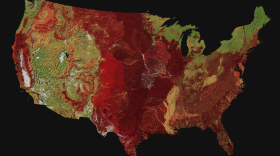
Nathan Rott
Nathan Rott is a correspondent on NPR's National Desk, where he focuses on environment issues and the American West.
Based at NPR West in Culver City, California, Rott spends a lot of his time on the road, covering everything from breaking news stories like California's wildfires to in-depth issues like the management of endangered species and many points between.
Rott owes his start at NPR to two extraordinary young men he never met. As the first recipient of the Stone and Holt Weeks Fellowship in 2010, he aims to honor the memory of the two brothers by carrying on their legacy of making the world a better place.
A graduate of the University of Montana, Rott prefers to be outside at just about every hour of the day. Prior to working at NPR, he worked a variety of jobs including wildland firefighting, commercial fishing, children's theater teaching, and professional snow-shoveling for the United States Antarctic Program. Odds are, he's shoveled more snow than you.
-
Despite its pledges to combat the worsening climate crisis, the Biden administration is opening tens of millions of acres in the Gulf of Mexico to oil and gas leasing.
-
A welcome early season deluge of rain in California has not ended the drought which persists in other parts of the West as well. The warming climate makes it harder to replenish rivers and reservoirs.
-
A Lancet medical journal report finds that human-caused climate change is worsening human health in just about every measurable way. It calls for more urgent action from world leaders.
-
The clean up and investigation continues after a major oil spill off California's coast. In a place where most marshes have been lost, it damaged a restored wetland that's a refuge for shorebirds.
-
Nearly two dozen species are being removed from the endangered species list because they are extinct. More than a million other species are at risk of extinction because of human activities.
-
For the millions of Americans dealing with wildfire smoke this summer, the message is to stay inside and shut windows. But new research shows smoke is making indoor air hazardous, too.
-
Tens of millions of Americans are forced to live with wildfire smoke now every year. New research shows that it's more invasive than previously thought, infiltrating homes, schools and offices.
-
There's a history of wildfire across America, a threat made worse by the warming climate. And more people are moving to fire-prone areas without realizing the danger.
-
Another large fire season is casting smoke across the country, with conditions ripe for major devastation. But not all fires are bad, and the widespread burning also brings long-term benefits.
-
The deadliest fire in American history was in a place many don't associate with wildfire: Northeast Wisconsin. The warming climate is amplifying the risk of more major fires outside the Western U.S.




